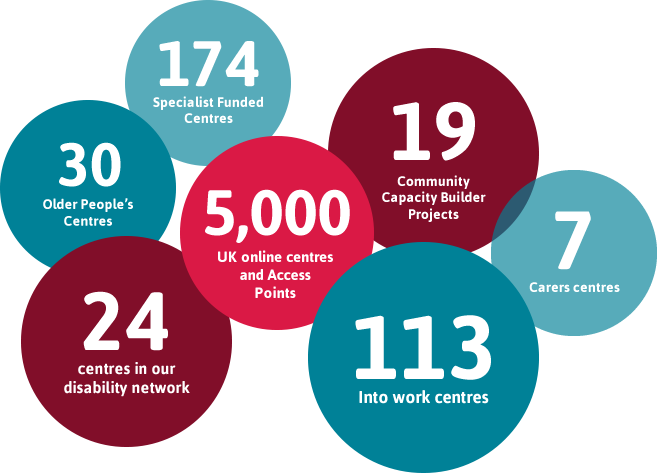The UK online centres network
The UK online centres network continues to be Tinder’s unique selling point, allowing us to deliver learning at scale, with the flexibility to respond to very local needs.
Centres share Tinder’s mission to make good things happen through digital technology, and use the training, marketing and business development resources on www.ukonlinecentres.com and the learning and tutor products on www.learnmyway.com to deliver it. Each is able to adapt to it’s own audiences, personalising engagementand progression. This year, we’ve supported 180 of those centres with grant funding, including the large scale Community Capacity Builders, and our four specialist networks.

Expansion into the nations
UK online centres have historically been in England only, due to funding from the Department for Business, Innovations and Skills, but with digital inclusion and assisted digital service delivery now fundamental to the thinking of government and the devolved governments - and even many corporations - it’s essential for Tinder Foundation to be able to scale up its delivery to include Scotland, Wales and Northern Ireland.
Over the last year we’ve been working with digital inclusion bodies from the Northern Irish and Scottish governments, and Communities 2.0 in Wales to include information on local digital inclusion venues into our UK online centres database. These details now appear on the online search on www.ukonlinecentres.com, and are part of the free telephone service on 0800 77 1234, so that anyone in the UK can now use it to find local support to get online.
This comprehensive UK database has already been instrumental in supporting UK wide digital inclusion programmes - including the Post Office’s Get Connected scheme, where local Post Offices across the country signposted people to their nearest centre using the new national database.
Our relationship with the nations continue to be strengthened through our ongoing project work, including work with SCVO, NIACE DC and Supporting Communities NI as part of a bid to the Big Lottery Fund’s Basic Online Skills programme.
Working with libraries
Libraries continue to make up around half of the UK online centres network, and are a key part of Tinder’s ability to deliver in local communities. The network of very local branches and the strength of their relationship with local communities creates instant outreach opportunities, and libraries are at the core of some our most successful projects.
Over the last year, Tinder Foundation has sought to consolidate that historical and local relationship with libraries by developing a stronger, national relationship with the Society of Chief Librarians (SCL). Together, we wanted to identify the libraries who have really taken digital inclusion on as part of their remit to share best practice with other libraries at the beginning of their digital inclusion journeys.
A successful seminar took place in November at Swiss Cottage Library with 50 libraries in attendance, to debate and make plans for how Tinder Foundation could support libraries to deliver digital inclusion. This was followed up with face-to-face Digital Champion training sessions in library authority areas including Buckinghamshire, Doncaster, Brighton and Hove.
In February 2014, Tinder Foundation was also awarded an SCL contract to deliver more workforce development training to the library network, which will see us training frontline staff to support learners to gain new digital skills using Learn My Way.
The results of this capacity building work with libraries has already seen a high number of libraries successfully apply for our 2014-15 specialist digital skills fund.
Specialist Networks
As well as funding centres to achieve Online Basics and Online Plus targets, Tinder Foundation’s aim is to help centres target the audiences most in need of digital inclusion support. Those include people with disabilities, carers, older people and those looking for work. With that in mind, our specialist networks were set up to help serve those audiences, gather and share best practice across the network.
In the year 2013-14 we funded 174 specialist centres, who collectively have delivered 20,961 Online Basics completions and 15,033 Online Plus completions.
Case study: Birmingham centre provides specialist support for unemployed people
Based in the Bordesley Green area of Birmingham, St Paul’s Crossover Centre provides a wide range of services, from IT and employability training and support for the over 50s, to childcare and conference facilities.

Julietth Ntiro, IT Administrator at Crossover says: “One of our key services has always been employability skills and the Online Basics and Online Plus courses on the Learn my way website are now essential to us in making sure that our clients get the skills they need, not just for the workplace, but to look and apply for jobs in the first place.”
A strong productive relationship with their local Jobcentre has proved essential for both parties. Julietth explains: “The majority of our clients that come looking for IT skills are referred by Jobcentres and they tell us that they send their clients to us because they know they’ll get the skills they need to start looking and applying for work online.”
As online services become more important for those looking for work, Crossover has seen demand for their services grow accordingly. Julietth tells us: “Universal Jobmatch has had a big effect on the number of people coming to the centre who are out of work and wanting to get online . Now more than ever, they know the chances of them finding work without digital skills are tiny.”
For Julietth, their relationship with JCP and other Government services is only going to become more important. She says: “We know that Universal Credit is on it’s way and this will only mean more people needing to get online - those looking for work, but claiming other benefits too.
“We have regular visits from JCP staff - I think they make sure new advisors come and see us so they know they’re referring clients to somewhere they can rely on. The confidence of our local Jobcentres means we can work together to help those who need it most.”